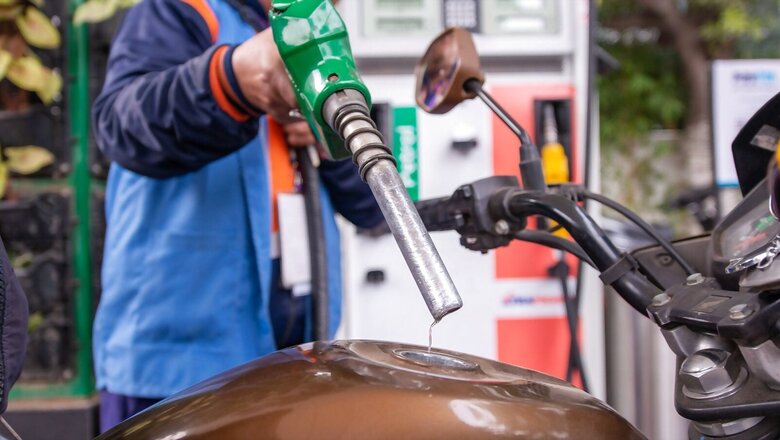
views
The excise duty on petrol was reduced by Rs 5 per litre (/l) and the excise on diesel was reduced by Rs 10/l by the central government on November 4, 2021. This settled the retail price of petrol in Delhi at Rs 103.97/l which is still higher than the average retail price of petrol in Delhi of Rs 101.89/l in October 2021. The retail price of diesel at Rs 86.67/l after the reduction in excise is lower than the price of Rs 90.17/l in October 2021. Excise duty (central levy) on petrol from October 2020 to October 2021 was unchanged at Rs 32.9/l until the reduction by 15% to Rs 27.90/l but value added tax (VAT) levied by the state government increased by 35% from Rs 17.71/l to Rs 23.99/l in Delhi. For diesel excise has remained unchanged at Rs 32.83/l until it was reduced by 31% to Rs 21.80/l on 4 November 2021, but VAT was also reduced by 22% from Rs 16.26/l to Rs 12.68/l in Delhi in the same period.
Trends in Excise, Value Added Tax
In 2015, global oil prices fell to around US $40/barrel (b) following OPEC (Oil Producing and Exporting Countries) decision spearheaded by Saudi Arabia, not to reduce oil output despite an increase in tight oil production from the USA. This protected market share of OPEC countries at the expense of oil revenue. The fall in global crude oil prices provided an opportunity to the Indian government to increase taxes on petrol and diesel. Changes in crude prices are not passed on to the consumer and, therefore, any fall in crude prices could be filled up by taxes by the government. For every US $1/b fall in the crude price, the government can increase taxes by about Rs 0.5/l without any change in the retail prices and the government has exploited this opportunity since 2015 to raise revenue.
Between March 2014 and October 2021, the excise on petrol charged by the central government increased by over 200% and the excise on diesel by over 600%. The VAT on petrol in Delhi increased by about 97% and that on diesel by about 118% in the same period. Other states also increased VAT substantially in this period. Central excise revenue from oil increased by over 163% from Rs 1.72 trillion (US $23 billion) in 2014–15 to over Rs 4.5 trillion (US $60.2 billion) in 2020-21. As most of the excise duty is charged as special or additional cess, which is not shared with the states, almost all the sum collected as excise on petrol and diesel goes to the central government. In the same period (March 2014-October 2021), VAT revenue from oil products increased by over 35% from over Rs 1.6 trillion (US $21.4 billion) to over Rs 2.1 trillion (US $28 billion). The low crude price window that allowed the government, both at the Centre and the state, to raise tax revenue appears to be closing now that crude prices are demonstrating a steady upward trend.
Crude Prices
The price of the Indian basket of crude at US $82.11/b is now close to the price in 2014-15, when it averaged US$84.16/b. Between May 2020—when global crude prices plunged following the declaration of a pandemic by the World Health Organisation (WHO)—and October 2020, the price of crude has increased by over 120%. Excise on both petrol and diesel remained constant in this period, but VAT (in Delhi) on petrol increased by 43% and VAT on diesel (Delhi) decreased by 18%. Overall, between May 2020 and October 2021, the 42% increase in the retail price of petrol can be partly attributed to the increase in global crude prices and partly to the increase in VAT. For diesel, the entire increase in the retail price can be attributed to increase in global crude prices because excise did not increase, and VAT decreased by 18%.
Crude Price Forecasts
According to the Energy Information Administration (EIA), crude oil prices increased over the past year as result of steady draws on global oil inventories, which averaged 1.9 million barrels per day (b/d) during the first three quarters (calendar year) of 2021. OPEC+ announcement in October that production targets will remain unchanged also contributed to the increase in crude price. EIA expects Brent crude prices to remain near current levels for the rest of 2021, averaging US$ 82/b in the fourth quarter of 2021. In 2022, EIA expects an annual average price of US $72/b because growth in oil production from OPEC+, increase in tight oil production from USA as well as from other non-OPEC countries is expected to outpace growth in oil demand. The World Bank expects average crude oil prices to be around US $70/b in 2021 and around US $74/b in 2022. Most of the international banks have projected much higher average price for crude oil in 2021 and 2022. Bank of America has forecast a price of US $120/b for Brent crude in 2022. Goldman Sachs expects oil prices to touch US $90/b by the end of 2021 and remain at about US $85/b in 2022. UBS and IHS Markits have also not ruled out US $90/b by the end of 2021.
Energy Price Inflation
The Reserve Bank of India (RBI) has shown that a sustained increase in crude price could increase the current account deficit (CAD) to gross domestic product (GDP) ratio, increase the fiscal deficit and cause an increase inflation, if price increase is passed on directly to the final consumers. The most recent report from the RBI observes that petrol and diesel registered double digit inflation consecutively since July 2020 and that sustained increase in international crude oil prices has kept petrol and diesel inflation firm at 23.8% and the Wholesale Price Index (WPI) petrol and diesel inflation at 54.2% in August 2021. It was this concern over inflation that drove the central government to reduce excise on November 4, 2021. State governments are expected to reduce VAT for the same reason. Given the upward trend in crude oil prices and the continued pressure on inflation, it is likely that the government will have to wait for another year or two before it can raise taxes on petroleum products.
The article was first published in ORF
Akhilesh Sati is the Program Manager for ORF Energy Initiative, Lydia Powell has been with the ORF Centre for Resources Management and Vinod Kumar has an MSc (Statistics) from Ramjas College, Delhi University. The views expressed in this article are those of the authors and do not represent the stand of this publication.
Read all the Latest Opinions here



















Comments
0 comment